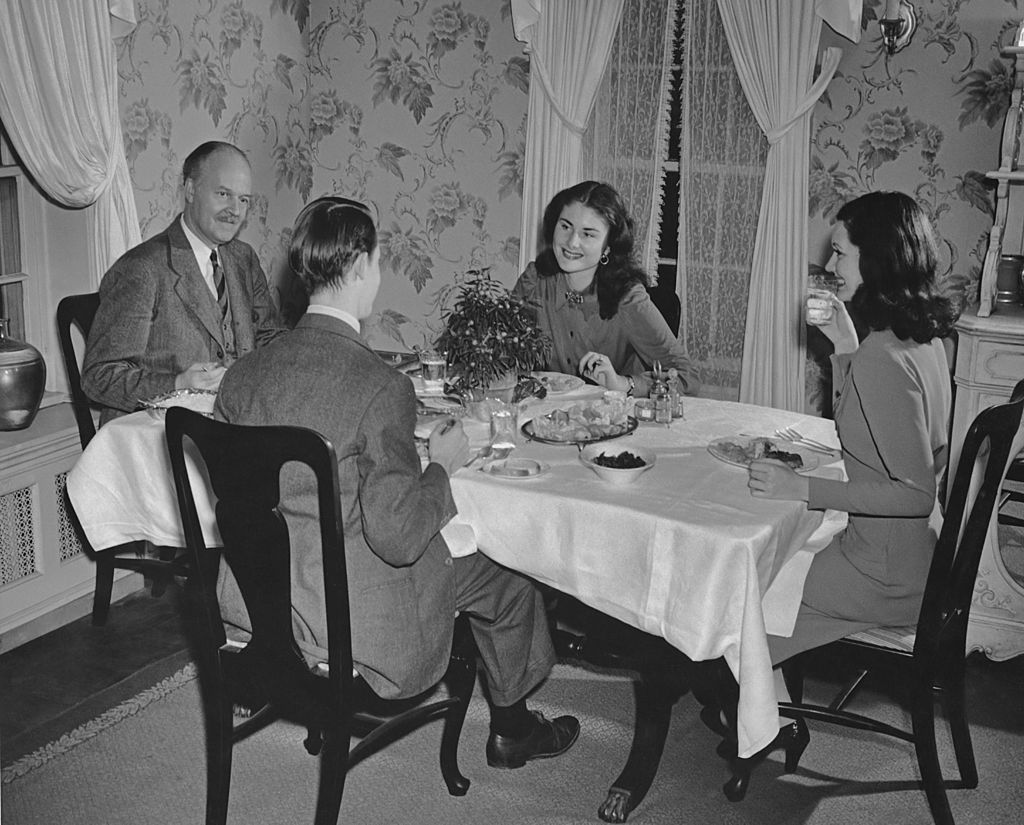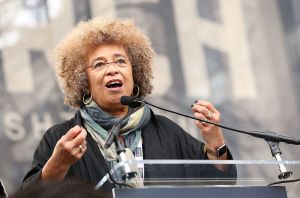Family dinners, like almost every area of American life, have become a subject of fierce politicization recently. In the years following Trump’s election in 2016, readers of elite progressive outlets were treated to a long parade of thinkpieces urging Americans, in the words of a 2019 Atlantic essay from Ibram X. Kendi, “to liberate our relatives from their abusive relationship with Trump’s alternative reality.” “This Thanksgiving, It’s Time to Take on Your Conservative Relatives,” declared a headline in the Nation. Molly Jong-Fast called on readers to “Deprogram your relatives this Thanksgiving.” A 2017 GQ article was perhaps bluntest of all: “It’s Your Civic Duty to Ruin Thanksgiving by Bringing Up Trump.” (“This Turkey Day, consider making life HELL for a few of your relatives.”)
Calls to reduce family members to partisan opponents — “maybe you’ll need to report a relative to the FBI!” Jong-Fast concluded gleefully — were a routine feature of our political discourse throughout the Trump era. But the pandemic undeniably exacerbated the family-dinner question. In December 2021, Anthony Fauci infamously suggested that Americans bar unvaccinated relatives from Christmas gatherings. Unvaccinated Thanksgiving guests “have prioritized their own comfort over yours and your other guests’, in a way that is potentially hazardous,” Esquire’s advice columnist wrote the month before. “Box them up some leftovers, leave them on the stoop, and enjoy yourself.” At least one poll showed that two-thirds of vaccinated Americans banned their unvaccinated relatives from Thanksgiving festivities.
As our parents’ two college-aged sons, we were subject to all of the same political-generational divides that wracked families across the country. But ironically, our experience was the inverse of the norm: whereas the stereotypical division is between liberal children and their conservative parents, we are the conservatives, our parents the long-suffering liberals.
For our family in Oregon, as for many across the country, the pandemic was a sort of self-contained dream-state, in which the normal rules governing the passage of time were suspended. Spring 2020 dragged on for an eternity and passed by in an instant. Our parents sold our house in Portland; we moved into a triple-wide in the small town of Hood River, an hour or so away. Information was thin, and fear escalated in its absence. When one of us returned from a road trip, our parents set up a wall of plastic sheeting between his room and the rest of the house, reasoning that it might provide some protection against infection. We ordered pizza on Friday nights, stuffing the takeout boxes into the oven for 20 minutes just to be sure potential germs were dispensed with. Every item from every grocery run was scrubbed relentlessly with disinfectant.
And then we waited. The two of us, Mom, Dad, and our loyal, ever-eager pup Quincy — a happy-go-lucky Flatcoat Retriever — holed up in the rolling hills of rural Oregon wine country. We were insulated from a faraway world that — existing abstractly in tweets and newspaper headlines — seemed to have suddenly spun out of control. Days passed into weeks and months; a hot, dry summer laid siege to our decrepit AC system. Then it was December, and the snow on the peak of Mount Adams, which filled the skyline outside our back window, descended across the Columbia River to arrive at our doorstep. Locals came with sleds; Quincy, a snow-dog if there ever was one, gleefully followed in hot pursuit.
All this was punctuated, at varying intervals, by an overwhelming amount of civic, political and environmental chaos. Summer wildfires forced us to evacuate to Idaho for more than a week; even there, hundreds of miles away, the smoke was bad enough that we were advised to stay indoors. Our deep-red rural segment of Oregon was mostly insulated from the turmoil of Portland’s Black Lives Matter protests, but its proximity was tangible; when Portland militants threatened on social media to “riot and loot” in downtown Hood River, the local police showed up in full force, accompanied by armed militia groups from the surrounding area who stood guard in front of businesses in the main strip. (For whatever reason, the keyboard radicals never materialized).
By that time, information about Covid risk was clearer, and many had decided it was time for life to start returning to normal. Conversations around the dinner table became more tense; divisions emerged along both ideological and generational lines. Although we were raised by liberal parents in one of the most famously progressive cities in the country, 2020 had pushed both of us rightward. Nate was shaken by his reporting on the protests down in Portland; Thomas was disillusioned with the dominant Covid narrative and the increasingly irrational restrictions at college. Students on campus were expelled en masse, seemingly with no recourse — for visiting another dorm room, for walking outside maskless, for going home for the weekend. When the vaccines were rolled out restrictions were dropped, only to be picked up again as the Delta variant whipped the public health apparatus back into panic.
Our growing skepticism of pandemic alarmism melded with age-based grievances, driven by the sense that we, young healthy twenty-somethings, were being unfairly subjected to the precautions taken by our older parents. From socializing with friends to debates over endless booster shots — utterly unnecessary, we argued, given that we had already received the original vaccine and belonged to an age cohort very unlikely to get seriously sick or die from Covid — we resented the suggestion that our parents’ risk tolerance had to be our own, an inevitable outgrowth of the odd one-size-fits-all nature of a pandemic response that sent millions of college students home to live with their families for the better part of a year.
Ours has always been an unusually direct family: whatever our other faults, passive-aggression is not one of them. The pandemic, Black Lives Matter, and a contentious presidential election all mapped onto our growing political and generational divide, even if it inverted the nation’s usual political-generational cleavage. (How many other familial debates involve the Gen-X parents defending Black Lives Matter protests against the criticisms leveled by their zoomer kids?) Our parents were patient — far more patient than their two headstrong sons — but the nation’s rising political temperature was felt at nightly family dinners.
The commentariat might find catharsis in imposing their misery on the rest of the country, but the “deprogram your relatives” manifesto always seemed absurd from the standpoint of our family. Of course we weren’t enemies. We weren’t abstract ideological foes or pawns for Atlantic thinkpieces. In the midst of it all, we were a family — muddling through, together.
Quincy sat at the center of it all. A master of de-escalation, he rescued countless family dinners — furiously twisting himself into knots or launching his nose into an unsuspecting lap when tensions flamed, watching with earnest concern as voices started to rise. He never seemed to care all that much about what we were arguing about; for him, it was just about spending time with us. In that sense, it was the best last two years of life a dog could ever have hoped for.
Quincy passed away this February, wracked by a swift, brutal cancer. In the space of a month, his little hobble became a heavy limp, and in his final days, he grew quiet and withdrawn — a shadow of the effervescent pup we had known for seven years. The morning of his death, we were 3,000 miles away — Thomas a college sophomore in New England, Nate working a new job in Washington DC. It was an odd, num ing distance; so much of the last two years had been spent at home, amid rolling lockdowns and online classes, navigating shifting goalposts and broken promises of returns to normalcy. Quincy was the rare constant — a small island of sanity in an unmoored world. And then — finally — we returned to something approximating life before Covid, and he was gone. A bittersweet punctuation mark.
But also an unexpected moment for reflection. Grief has a way of suspending time. To mourn is to step outside oneself, if only for a short time. It’s the same way with love: Francis Weller once wrote that “grief and love are sisters, woven together from the beginning. Their kinship reminds us that there is no love that does not contain loss and no loss that is not a reminder of the love we carry for what we once held close.” As conjoined twins, the intensity of love and sorrow can remove us from the constant churn of the day-to-day. So it was with our little pandemic sanctuary, and the adoring puppy at the heart of it all. How could politics ever change that? Family, after all, is a reprieve from — not a substrate for — the madness of the broken world outside.
This article was originally published in The Spectator’s July 2022 World edition.

























